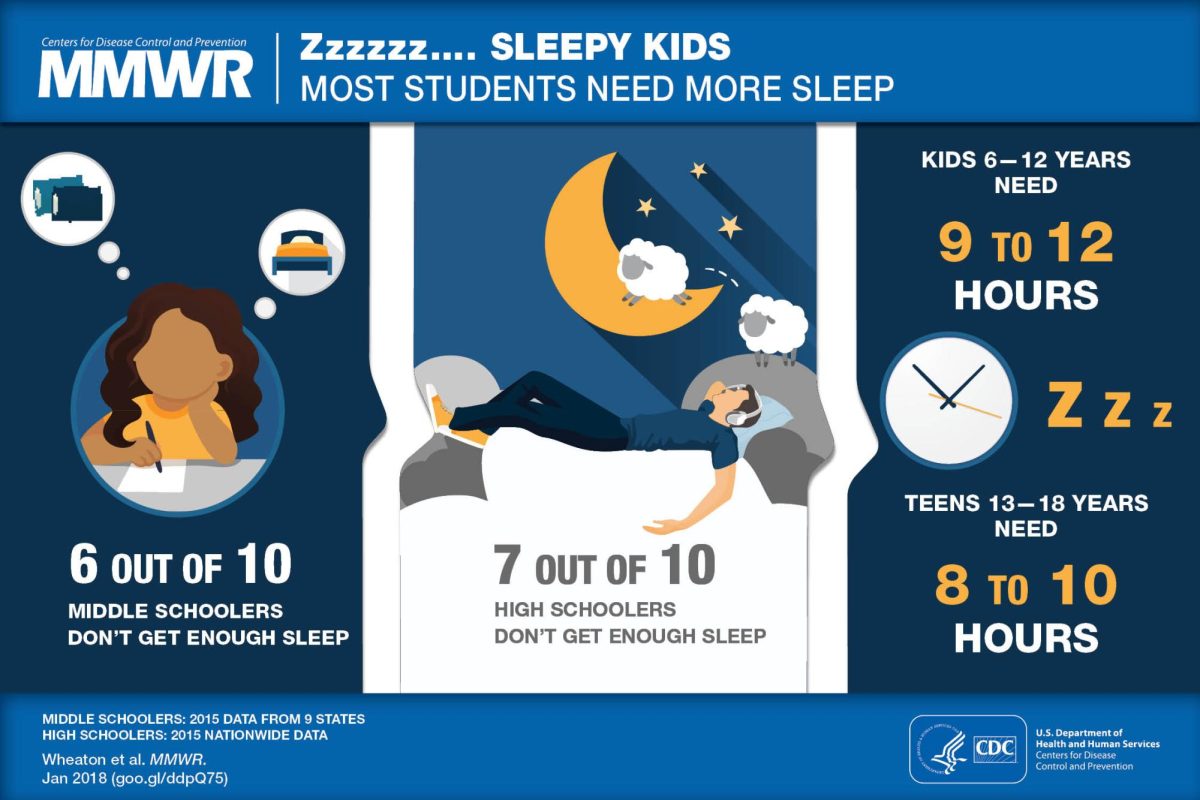When did you sleep last night? When did you wake up? It might not seem important, but here’s something that might cause interest– according to CDC.gov, around seven out of ten high school students do not get enough sleep on school nights, which is seventy-two point two percent of the high school population. If this data is applied to J.W. North High School, around one thousand six hundred nineteen students out of two thousand two hundred twenty-seven will be sleep deprived, and you are most likely one of them.
Sleep deprivation is hitting adults as well as teens, and hard, especially in industrialized countries. That is a problem, because sleep deprivation can become chronic and lead to many negative impacts on health. According to a study done by the National Sleep Foundation, at least 100,000 traffic accidents occur every year due to fatigue or drowsiness (Garey; Childmind.org).
Another impact of sleep-deprivation is the inability to have self-control, including over emotions, actions, and mood. Teens who do not get enough sleep on a regular basis are more likely to engage in suspicious behavior and use substances. Not obtaining enough sleep leads to restlessness, shortened attention span, aggressiveness, and even depression. Sleep deprivation is associated with a higher mortality risk (shocking!). On the positive side, sleep is crucial to growth, development, and the immune system. According to Sumit Bhargava, MD, on Stanford Medicine, “‘Sleep has been postulated to help with brain development and the development of memories,’ he says. ‘In addition, adequate sleep appears to be protective against chronic diseases, such as obesity and diabetes.’”
What are the stages of sleep? There is NREM (non-rapid eye movement), pointing to the first 4 stages of sleep, with stage 3 and 4 being the deepest. There is REM (rapid eye movement) sleep, which is when the brain becomes active like when it was awake. Deep sleep is critical for muscle, cell, and tissue repair and growth, and strengthens the immune system. REM sleep is when much of our dreams occur. This rhythm of sleep is essential to memory, learning, and creativity (Eric Suni; Sleepfoundation.org), explaining how we might find solutions to problems after we wake. Deep sleep is the hardest to wake from, and light sleep (stage 2) and REM is easiest to wake from. According to Eric Suni from Sleepfoundation.org, “You spend the most time in deep sleep during the first half of the night. During the early sleep cycles, N3 stages commonly last for 20 to 40 minutes. As you continue sleeping, these stages get shorter, and more time gets spent in REM sleep instead.” This means that if you wake up extra early in the morning, you could potentially be losing a portion of REM sleep.
So, what are some things that cause teenage sleep-deprivation? Factors include but are not limited to, hormonal time shift where puberty hormones shift the body clock a few hours forward, which makes teens sleepy a few hours later. Busy school schedule/after-school activities, going to bed a short while after using phones, exposure to light, time spent on leisure activities such as on the Internet, video games, etc can also have a affect. As well as vicious circle or not getting enough sleep, causes the teen brain to become more active, making it harder to fall asleep. (Better Health Channel). Isn’t it ironic that, based on the “vicious circle”, the more sleep-deprived you are, the harder it is to fall asleep? Often, it seems that teens view sleep as less important than school work, video games and social media because they are seen as priorities to them.
Knowing all the facts stated above, what can people do to obtain more sleep hours? To obtain more sleeping hours, it is recommended to remove electronic devices from the bedroom. To raise an example– a teen named Bob wants to check something on his phone–but if he waits until tomorrow, he could potentially gain 20-30 minutes more of sleep tonight. The presence of a charger in Bob’s room might lead Bob to charge his phone, which might turn into Bob eating time away on his phone, ultimately chomping into Bob’s regular sleep hours, which weren’t that many to begin with.
Getting physical activity during the day, avoiding large meals and caffeine before bedtime, having a consistent bedtime and wake-time, as well as making your bedroom quiet, dark, and at a comfortable temperature contribute to having better sleep. Having better sleep during the night can cause you to feel more productive the next day.
Perhaps the reader does not agree that teenagers should get at least 8 hours of sleep. Sleep is important and it is beneficial to gain a better understanding of it as well as the negative cost of sleep deficiency in teens. Something ironic to end this article? The writer is pretty sleep-deprived.








